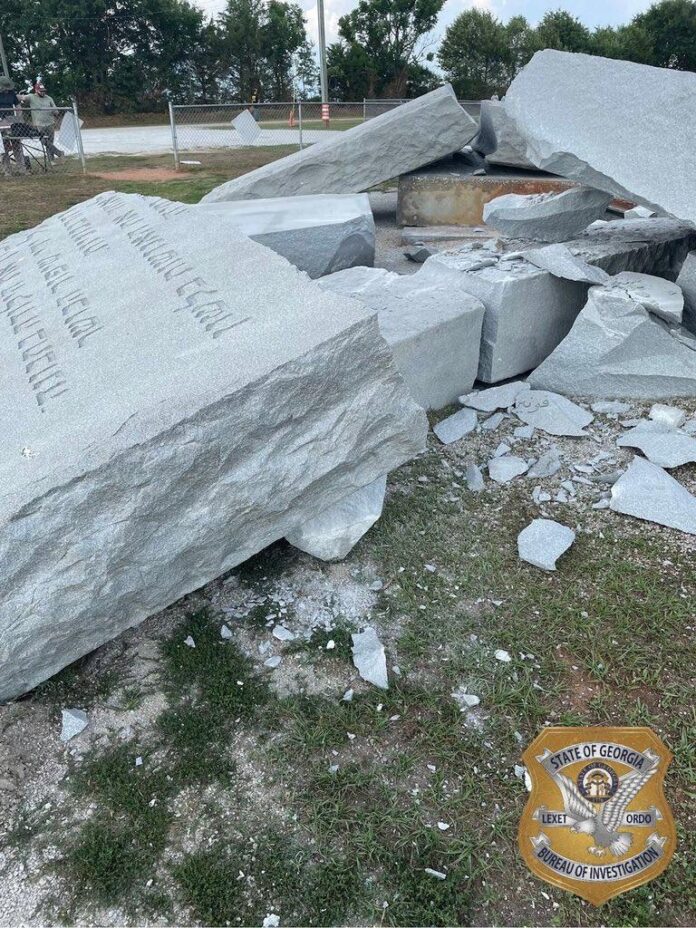An early morning attack led to the demolition of the Georgia Guidestones, a roadside attraction about 90 miles east of Atlanta that draws thousands of visitors every year and has been the centre of a conservative Christian conspiracy theory that claims the structure has satanic undertones.
At around 4am on 6 July, security cameras caught footage of an explosion that destroyed one of the four panels that make up the Guidestones and a silver sedan being driven away from the scene. The Georgia Bureau of Investigation (GBI) released the footage on Twitter later that day, which shows splinters of granite flying off the massive structure after the explosion and a thick, grey cloud enveloping the site. The GBI also tweeted that the structure, for safety reasons, was later demolished.
The Georgia Guidestones have an enigmatic past, which has made them an easy target for conspiracy theories and rampant speculation. Built in 1980, the four slabs of polished granite, each of which weighs 20 tons, were inscribed with ten New Age-y suggestions for living that have just the slightest hint of being written by a firm believer in eugenics. The first two edicts give away the plot. Number one: “maintain humanity under 500,000,000 in perpetual balance with nature”. Number two: “guide reproduction wisely—improving fitness and diversity”. The rest follow in kind, though tend more toward encouraging a respect for nature, balance and reason.
According to archival news articles, the structure was thought up and paid for by a group of citizens represented by a mysterious man named Robert C. Christian, who thought the world was on the cusp of nuclear disaster and wanted help guide future generations that survived the fallout. The advice is written in eight different languages—English, Spanish, Russian, Chinese, Arabic, Hebrew, Hindi and Swahili—each on a different side of the pale grey slabs. On the sides, written in Egyptian hieroglyphics, classical Greek, Sanskrit and Babylonian cuneiform, the structure’s grandiose purpose is clearly written: “Let these be guidestones to an age of reason.”

The Georgia Guidestones before the bombing on 6 July Photo by Quentin Melson, via Wikimedia Commons
The structure, a kind of Cold War Stonehenge, also had a few astronomical features that made it ripe for lovers of conspiracy theories. An eyehole drilled into the centre column points to the north star, and a long slit in the column alligns with the solar solstices and equinoxes. And in case the anicipated nuclear blast had destroyed all the world’s time pieces, another hole was drilled into the structure’s capstone that shot a beam of sunlight onto the centre stone every day at noon.
Since before they were completed, the Guidestones were considered suspicious—if not downright evil. During construction, a local minister in the town of Elberton, where the structure was built, said he thought the site would become a cradle for occult groups and that “someday a sacrifice would take place there”, according to a report by Wired. More recently, failed Republican gubernatorial candidate Kandiss Taylor, who billed herself as the “only candidate bold enough to stand up to the Luciferian Cabal”, said the stones were satanic and pledged to tear them down as part of her campaign. “God is God all by Himself,” Taylor tweeted after the attack. “He can do ANYTHING He wants to do. That includes striking down Satanic Guidestones.”
It is unclear if any gods were involved in the bombing or driving the silver sedan. According to an NPR report, Elbert County sheriff’s deputies, Elberton police and the GBI are among agencies investigating the attack and there are currently no suspects.

























